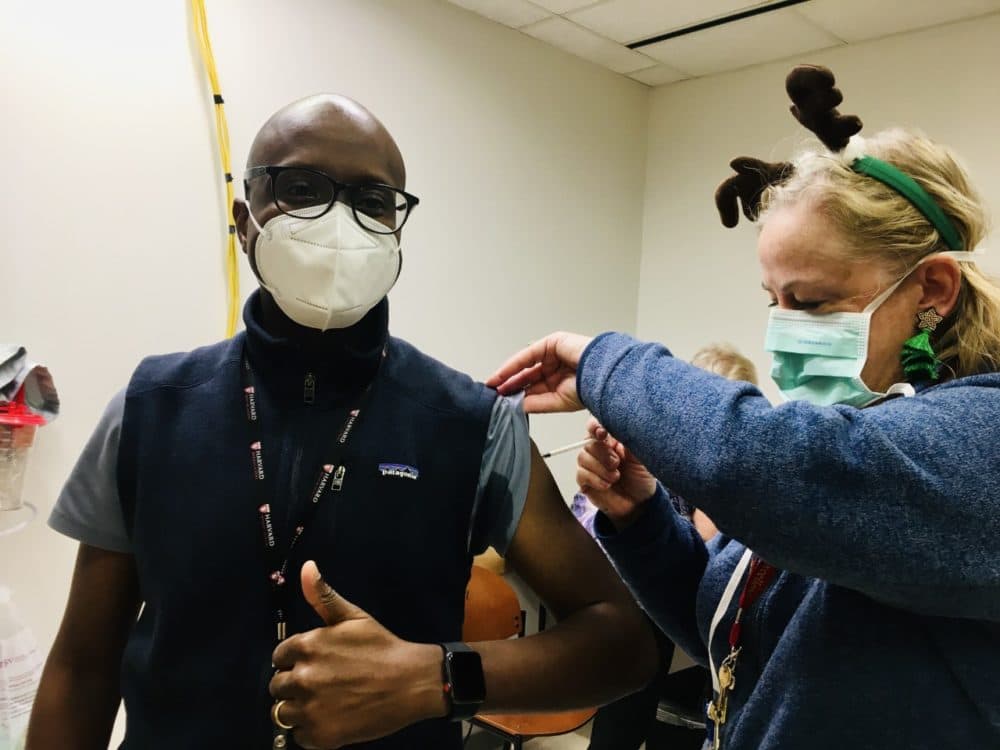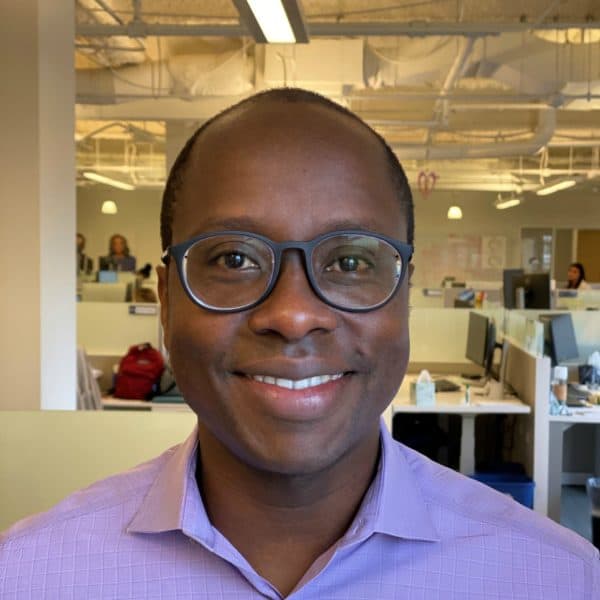Advertisement
Commentary
My Respect For This Virus Came Early. I'm Grateful For Science — And The Vaccine

At my first hospital shift in March, after the Massachusetts state of emergency began, I was asked to evaluate a young and previously healthy COVID-19 patient who struggled to breathe and coughed uncontrollably. I knew we were facing a highly transmissible and dangerous virus, and yet knowledge about the infection and how to manage affected patients was rapidly evolving. Much was still unknown. Wearing a gown, gloves, mask, and face shield, I entered the patient’s room for a short examination and then completed the encounter by phone.
The following night, I returned to learn that the patient had been intubated and placed on a ventilator after their breathing had continued to deteriorate. It was the beginning of what would be a long ICU stay for them. Bearing witness to this patient’s illness and that of several others entrenched my fear and respect for the virus. I knew that if I got infected, there was no guarantee I would be OK. I realized that I would never feel safe until there was an effective vaccine, which I thought was years away. In early April, it was proposed that the earliest a vaccine could arrive was over the following 12 to 18 months, a rather optimistic timeline.
Just a year ago, a then-mysterious virus originating in China swept through Asia and then Europe. Like a tsunami, the pandemic crashed on U.S. shores and by the second week of March, COVID-19 rates were escalating in Massachusetts. On March 10, Governor Charlie Baker announced a state of emergency. It was quite officially the end of normal.
What we didn’t realize was that our lives were about to be radically altered by anxiety about the virus and obsessiveness to minimize risk of exposure to it ...
Until the first week of March, life was normal in my orbit. My wife and I traveled to the southwest U.S. on vacation and hosted a small gathering upon our return. What we didn’t realize was that our lives were about to be radically altered by anxiety about the virus and obsessiveness to minimize risk of exposure to it: My wife was pregnant. We welcomed our first child during quarantine.
Tuesday, less than nine months after the Massachusetts state of emergency was declared, I received my first dose of the Pfizer-BioNTech vaccine. Having witnessed the spectrum of disease that COVID-19 can inflict on the old and young and those with and without pre-existing conditions alike, I feel a deep sense of relief. I feel like we are on the cusp of taming an invisible enemy. At the same time, I am amazed at how quickly the vaccine was developed, tested and distributed across the U.S.
On December 11th, the FDA granted authorization for distribution of the Pfizer-BioNTech COVID-19 vaccine, only 11-months since the SARS-Cov-2 virus was sequenced. Two days later, I watched with excitement as footage showed trucks transporting vaccine vials out of the Pfizer plant in Michigan. By the third day, the vaccine had been delivered to all 50 states and I saw clips of Sandra Lindsay, director of critical care nursing at Long Island Jewish Medical, becoming the first person to receive an approved COVID-19 vaccine in the United States. Soon afterward, Moderna’s COVID-19 vaccine also received emergency use authorization from the FDA.
The launch of COVID-19 vaccinations in the U.S. is a testament to incredible collaboration, operational excellence and breathtaking speed of execution for which we owe a debt of gratitude to the scientific community and U.S. government. Granted the underlying mRNA technology leveraged to develop these vaccines was years in the making, but take nothing away from the scale of execution and achievement we just witnessed. We must also applaud clinical trial participants for their essential role in helping to prove the safety and efficacy of the vaccines in the short-term.
Advertisement
I can hold my 4-month-old son without worrying about what I might have brought home from work.
While the vaccines are being rolled out, the pandemic continues to rage in the U.S. and globally. Indeed, it will take months until everyone in the U.S. can access the vaccine while access for billions in low and middle-income countries remains largely unsolved. It remains imperative for each of us, whether or not we receive the vaccine, to stay committed to doing all that we can to slow down the pandemic. This includes avoiding indoor gatherings, wearing masks in public, and following other public health guidance. Only time will tell whether the current vaccines will remain effective in the long-term, especially as new variants of the virus are emerging. Additionally, asymptomatic spread of the virus may be possible even after vaccination, which poses risk to many populations who may not be vaccinated at this time, such as children.
Yet this is a moment for us to celebrate. I am happy that my family can feel safer, and I can hold my 4-month-old son without worrying about what I might have brought home from work. I am relieved for fellow health care workers who have put their lives on the line for months to care for the sick. Many of them have experienced the loss of colleagues to COVID-19 at a significant psychological toll. I celebrate for those at high risk who will soon be protected, including the elderly, those with pre-existing conditions, the incarcerated and essential workers who literally kept the lights on during this pandemic. There are many we have lost and must grieve, while the pandemic has also illuminated and exacerbated inequalities that we must continue to confront. For today, let us collectively take a moment to savor a human and scientific feat of truly epic proportions.
